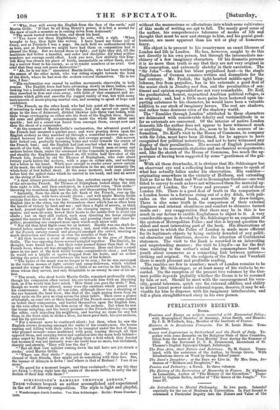SCHLESINGER'S RAMBLES THROUGH LONDON.. THEM volumes bespeak an author accomplished
and experienced in the art of literary composition. The style is light and playful, 1B5a • Wanderangen durch London. Von Max Schlesinger. Berlin: Franz Dunker.
without the mannerisms or affectations into which some cultivators of this mode of writing are apt to fall. The manly good sense of the author, his comprehensive tolerance of modes of life and thought that must be new and strange to him, and his genial good- humour, are more apparent than his wit or play of humorous fancy.
His object is to present to his countrymen an exact likeness of London and life in London. He has, however, sought to do this not directly in his own person, but through the intermediate ma- chinery of a few imaginary characters. Of his dramatis personae it is no more than truth to say that they are not very original in their conception, and extremely sketchy in their execution. The " Sir John "—the kind but blunt prejudiced host—is the staple Englishman of German romance-writers and dramatists for the last century. Mr. Froliok, the light-hearted middle-aged Eng- lishman, free from prejudice, has in his externals a good deal of the senior clerk in Dontbcy and Son, and the peculiarities of sen- timent and opinion superadded are not very remarkable. Dr. Keif, the goodnatured, honest, unpractical Austrian political refugee, is an original; and, had a little more pains been bestowed upon im- parting substance to his character, he would have been a valuable addition to our stock of imaginary heroes. The rest are shadows, and rather tame denizens even of the shadowy world. The "Rambles through London" attributed to these characters are delineated with considerable felicity and verisimilitude in so far as externals are concerned.' Of the interior of native London domestic life the author does not appear to have witnessed much or anything. Dickens, Punch, &c., seem to be his sources of in- formation. Dr. Heirs visit to the House of Commons, in company with Sir John, must have been ill-timed, for he appears to have recognized few political notorieties, and not to have witnessed any display of their peculiarities. His account of English journalism is limited to its mercantile statistics and mechanical arrangements; and, like the sketch of the House of Commons, has much the ap- pearance of having been suggested by some " gentleman of the gal- lery." With all these drawbacks, it is obvious that Mr. Schlesinger has an observant eye and a reflecting head when he comes to speak of what has actually fallen under his observation. His rambles— originating somewhere in the vicinity of Holborn, and extending East as far as the Bank and West to Kensington Gardens—are well fitted to convey to such as have not witnessed them the material ap- pearance of London, the " form and pressure " of out-of-doors London life. There is a good deal of truth in the comparison of a London house to a fortress rising out of a dry ditch, with pali- sades on the external bank, and accessible by draw-bridges. There is also some truth in the comparison of their external dinginess and internal cleanliness and comfort to ohimnies turned inside out : any exaggeration that there may be in this is too much in our favour to entitle Englishmen to object to it. A very considerable space is devoted by Mr. Schlesinger to an exposition of the system of Metropolitan Police ; and this is beyond question the ablest and most interesting part of the book. His illustrations of the extent to which the Police of London is made more efficient for its legitimate objects by being entirely denuded of any politi- cal character and functions, deserve the attention of Continental statesmen. The visit to the Bank is recorded in an interesting and unpretending manner ; the visit to Lloyd's—as for the first time realizing to the author's mind the commonplaces heard in youth about commerce as a connecting link between nations— striking and original. On the subjects of the Parks and Vauxhall there is much pleasant and profitable reading.
The rambles are few in number; much of London remains to be visited by Mr. Schlesinger, or at least many of his visits to be re- corded. On the reception of the present two volumes by the Ger- man public depends prpbably whether the theme is to be resumed by him or not. Should he meet with the encouragement his vera- city, genial tolerance, quick eye for external oddities, and ability to detect latent power under external repose, deserve, it may be ad- visable for him to dispense with his imaginary interlocutors, and tell a plain straightforward story in his own person.


























 Previous page
Previous page